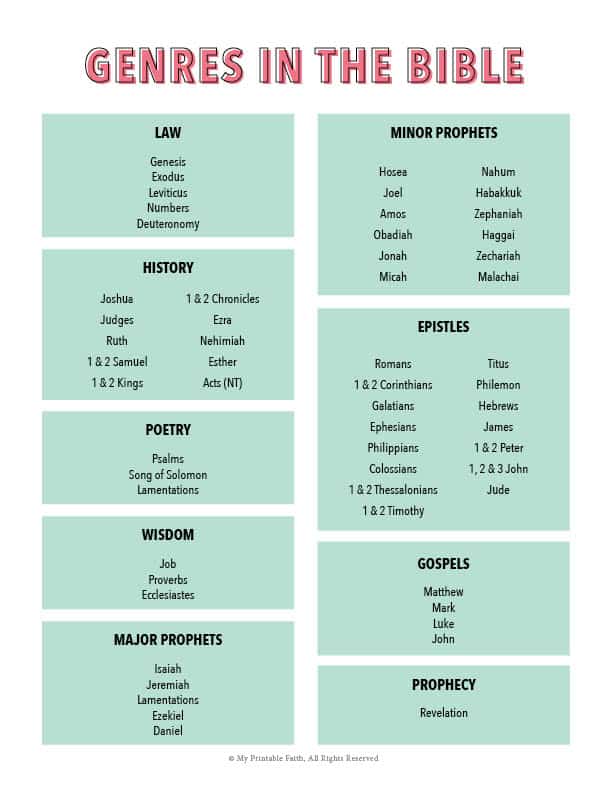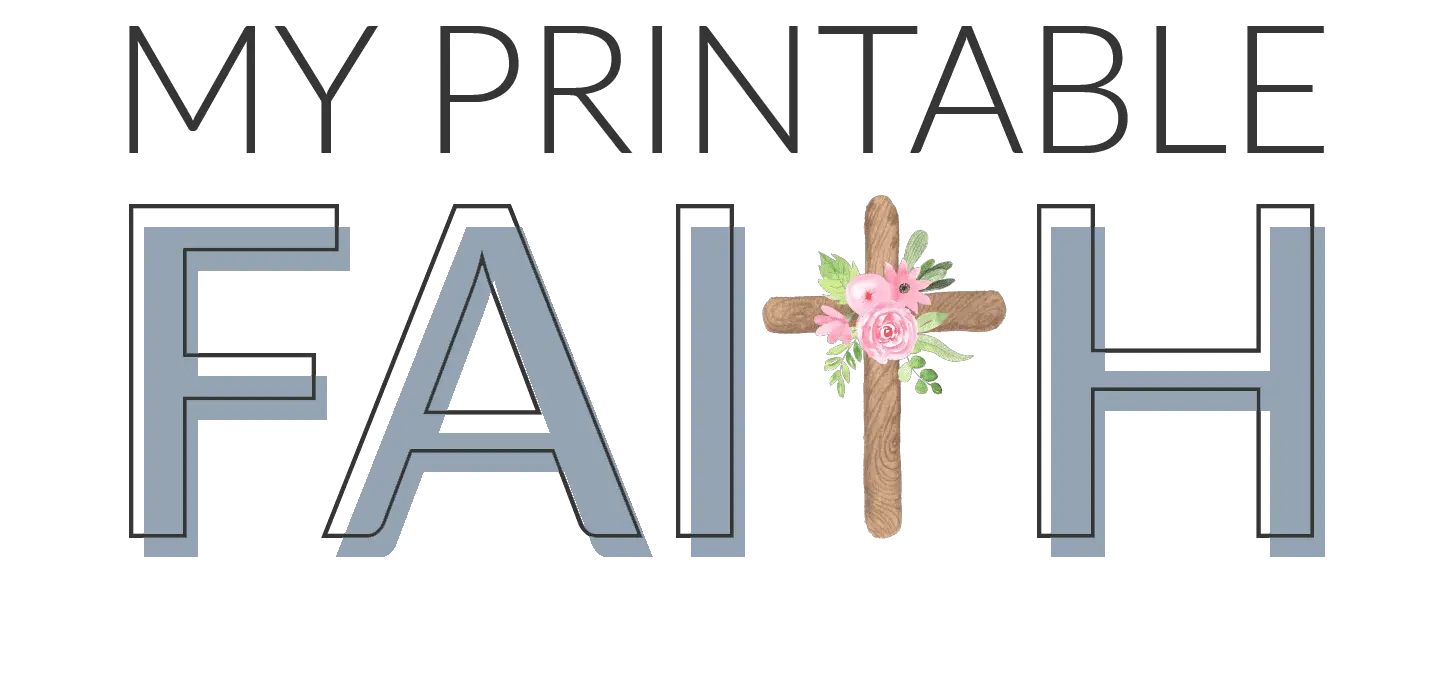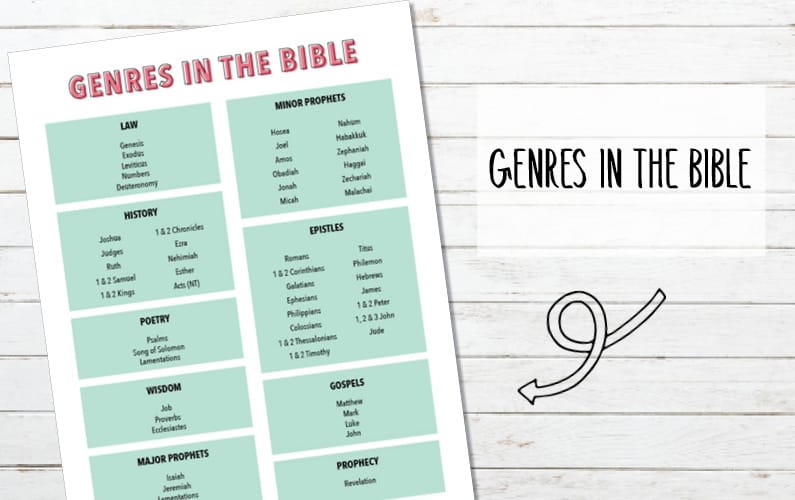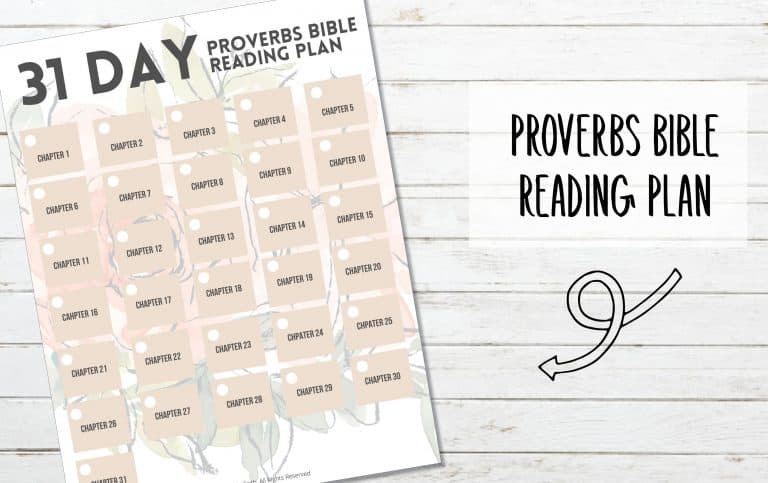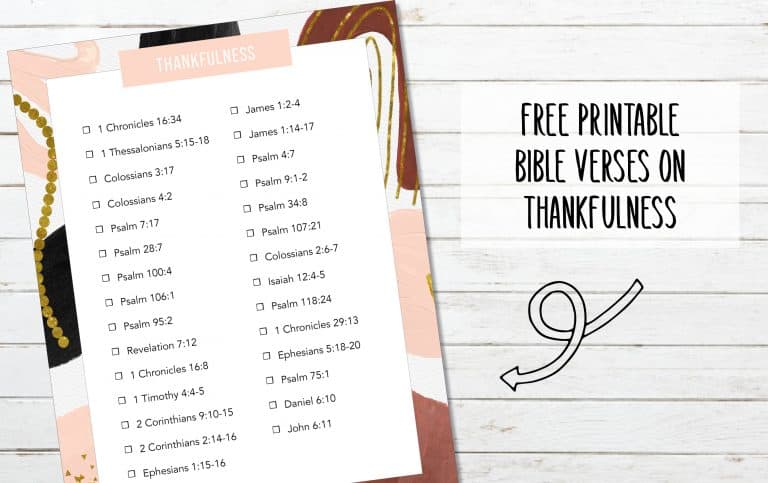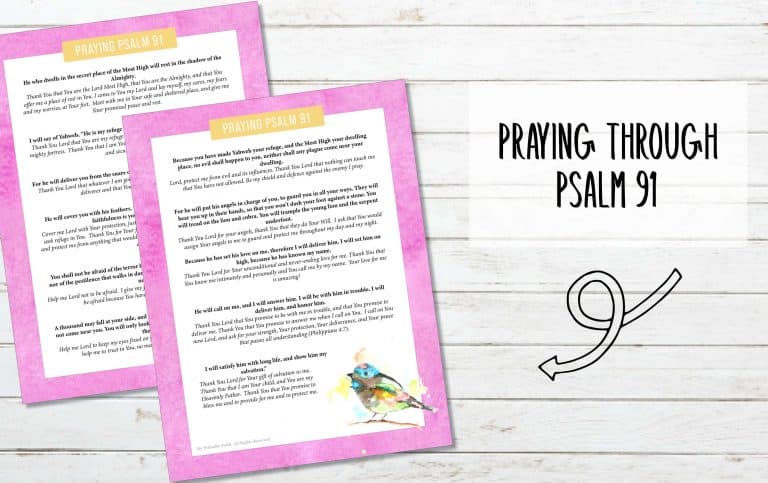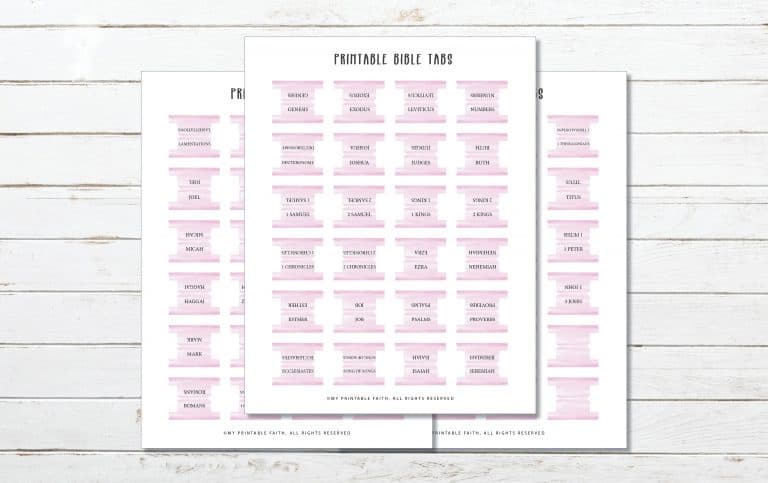The Bible is a collection of books which are integral to the Christian faith.
It comprises of 66 books, 39 in the Old Testament and 27 in the New Testament.
It was written by over 40 authors over a period of thousands of years.
Despite the time span and the number of authors, the books of the Bible are completely compatible with each other.
Let’s take a look at the 9 Genres in the Bible and Why they Matter to you today.
Law
The books of the Law are:
- Genesis
- Exodus
- Leviticus
- Numbers
- Deuteronomy
The first 5 books of the Bible are the books of the Law, also known as the Torah or the Pentateuch.
They were written by Moses, except for the last portion of Deuteronomy which tells of Moses death, between 1450BC to 1410BC.
They tell of the beginnings of life, the world and human history, of sin and separation from God, and God’s plan for redemption.
They are called the books of the Law because they record the Laws and instructions that God gave to Moses.
Knowing and understanding our beginnings, God as our creator, our separation from God through sin, and God’s plan of redemption from the beginning of time give us a foundation for our faith and helps to shape our worldview.
History
The books of History are:
- Joshua
- Judges
- Ruth
- 1 & 2 Samuel
- 1 & 2 Kings
- 1 & 2 Chronicles
- Ezra
- Nehemiah
- Esther
- Acts (NT)
The History section of the Bible (Old Testament) is made of up 12 books from Joshua to Esther and cover a period of 800 to 1000 years and I’ve included the book of Acts from the New Testament.
They span the history of Israel from their entry into the Promised Land, the reign of the Judges, and then of the Kings, Israel’s division into the Northern and Southern Kingdoms, the Northern Kingdom’s fall to Syria, the Southern Kingdoms exile into Babylon, and their return to Jerusalem.
And then in Acts it gives us a record of the birth and history of the early church.
We can learn many lessons from the defeats and victories of God’s people through the books of History.
We see God’s never-ending love for His people, despite their turning away from Him time and time again, He promises that He is their God and He will not forsake them.
It is comforting to know that God has a plan for us and His desire for us is to bless us, regardless of how many times we fail and fall short, God is always there, to comfort us, to deliver us, to bless us.
Poetry
The books of Poetry are:
- Psalms
- Song of Solomon
- Lamentations
The 3 Poetry books are made up of the Song books, Psalms, Song of Solomon, and Lamentations.
These books are prayers and songs which were sung to God.
They talk about the experiences of God’s people, not from a factual viewpoint, but from a heart point of view.
These books help us to understand and connect with God’s people and His Word, we can relate to their experiences, their emotions, and their hunger for God.
Many of the Psalms can be use as prayers of worship in our own quiet times with God.
Wisdom
The books of Wisdom are:
- Job
- Proverbs
- Ecclesiastes
The 3 Wisdom books are Job, Proverbs, Ecclesiastes.
They talk about the world, what it should be, and what it is.
They offer God’s perspective and practical wisdom to everyday living.
Wisdom is to be desired. Proverbs 16:16 says, “How much better it is to get wisdom than gold! Yes, to get understanding is to be chosen rather than silver.”
The book of James encourages us to ask God for His wisdom. Why not make it your prayer.
Major Prophets
The books of Major Prophets are:
- Isaiah
- Jeremiah
- Lamentations
- Ezekiel
- Daniel
These 5 Major Prophets of the Old Testament record the history of the Israelites. They are not Major Prophets because they are more important than the Minor Prophets but simply because the books are longer and reflect a lengthier insight into the history at the time.
The role of Prophets was not just to foretell the future, but they were to be the spokesperson for God, declaring His truth and His will to His people.
They spoke God’s Words, giving warnings and calling for repentance, and proclaiming words of encouragement to God’s people.
These books foretell God’s plan for our salvation, they speak of the Messiah and the events that lead to His birth, and His death.
Minor Prophets
The books of Minor Prophets are:
- Hosea
- Joel
- Amos
- Obadiah
- Jonah
- Micah
- Nahum
- Habakkuk
- Zephania
- Haggai
- Zechariah
- Malachi
These 12 Minor Prophets are no less important than the Major Prophets, they are simply called Minor Prophets because of the length of the books.
Like the Major prophets their job was to be God’s spokesperson to His people.
They follow the same pattern as the Major Prophets of warning of pending judgement because of sin, an explanation of the sin, a description about the judgement to come, a call to repentance, and a promise of blessing and deliverance.
We can be encouraged by God’s forgiveness and promised blessing, no matter how we may have grieved Him, if we come to Him in repentance.
Gospels
The books of the Gospels are:
- Matthew
- Mark
- Luke
- John
The Gospel are possible the most well known of the Bible genres.
The word Gospel means Good News and tells of the good news of Jesus Christ and His gift of salvation for all who believe.
Each of the books tells of the birth, life, ministry, miracles, teaching, and death of Jesus, each highlighting the stories from the perspective of, and in the style of, the writer.
The Gospels reveal to us the fulfilment of the prophecies about Jesus.
They show us God’s plan for our salvation and how we can come into a relationship with God through faith in Jesus.
Epistles
The books of the Epistles are:
- Romans
- 1 & 2 Corinthians
- Galatians
- Ephesians
- Philippians
- Colossians
- 1 & 2 Thessalonians
- 1 & 2 Timothy
- Titus
- Philemon
- Hebrews
- James
- 1 & 2 Peter
- 1, 2 & 3 John
- Jude
There are 21 Epistles in the Bible.
An Epistle is a letter or a message which is of an instructive nature, like that of a mentor or teacher to a student.
They were written by apostles to give instruction and teaching in the Christian faith.
The main authors were Peter, John, James and Jude.
Some are written to specific churches and some to the wider church, but regardless of who they were written to, they are relevant and applicable to us today.
End Times Prophecy
The book of the End Times Prophecy is:
- Revelation
The book of Revelation was written around 95AD by the apostle John whilst he was in exile on the Island of Patmos.
It is the last book of the New Testament, and indeed the last book of the Bible.
It is prophetic in nature telling of the future of the world and predicting the end times.
It is the only book that promises a blessing to anyone who reads it.
There are many interpretations of Revelation but regardless of what view point you take the end is always the same, good triumphs over evil!
We often think of judgement when we think of Revelation, but rather than judgement, for those of us who are in Christ, it is a book of hope and victory.
God reigns supreme and we will be with Him.
Every Scripture is God-breathed and profitable for teaching, for reproof, for correction, and for instruction in righteousness, that each person who belongs to God may be complete, thoroughly equipped for every good work. 2 Timothy 3:16-17
